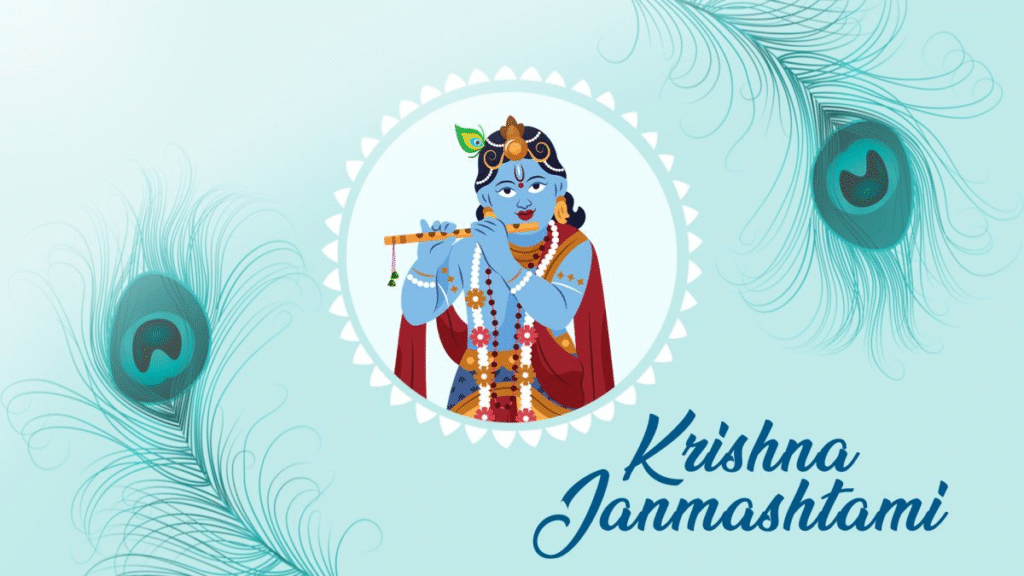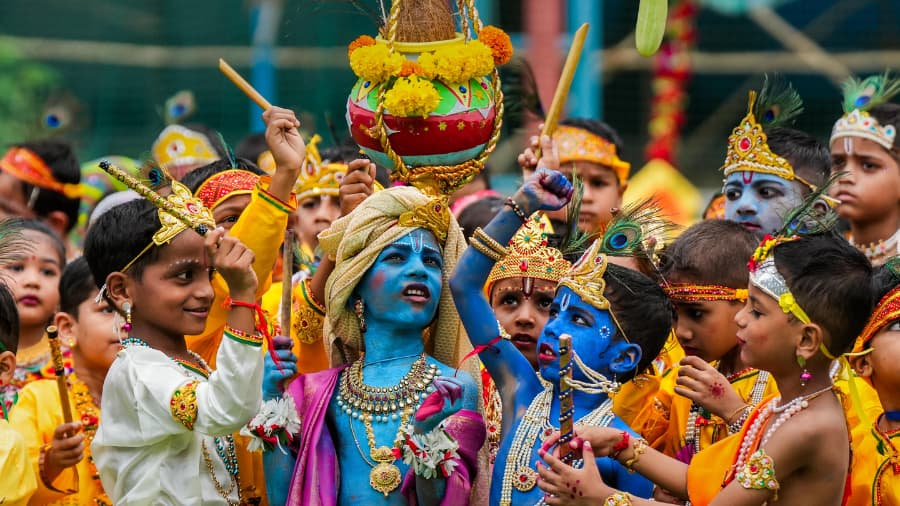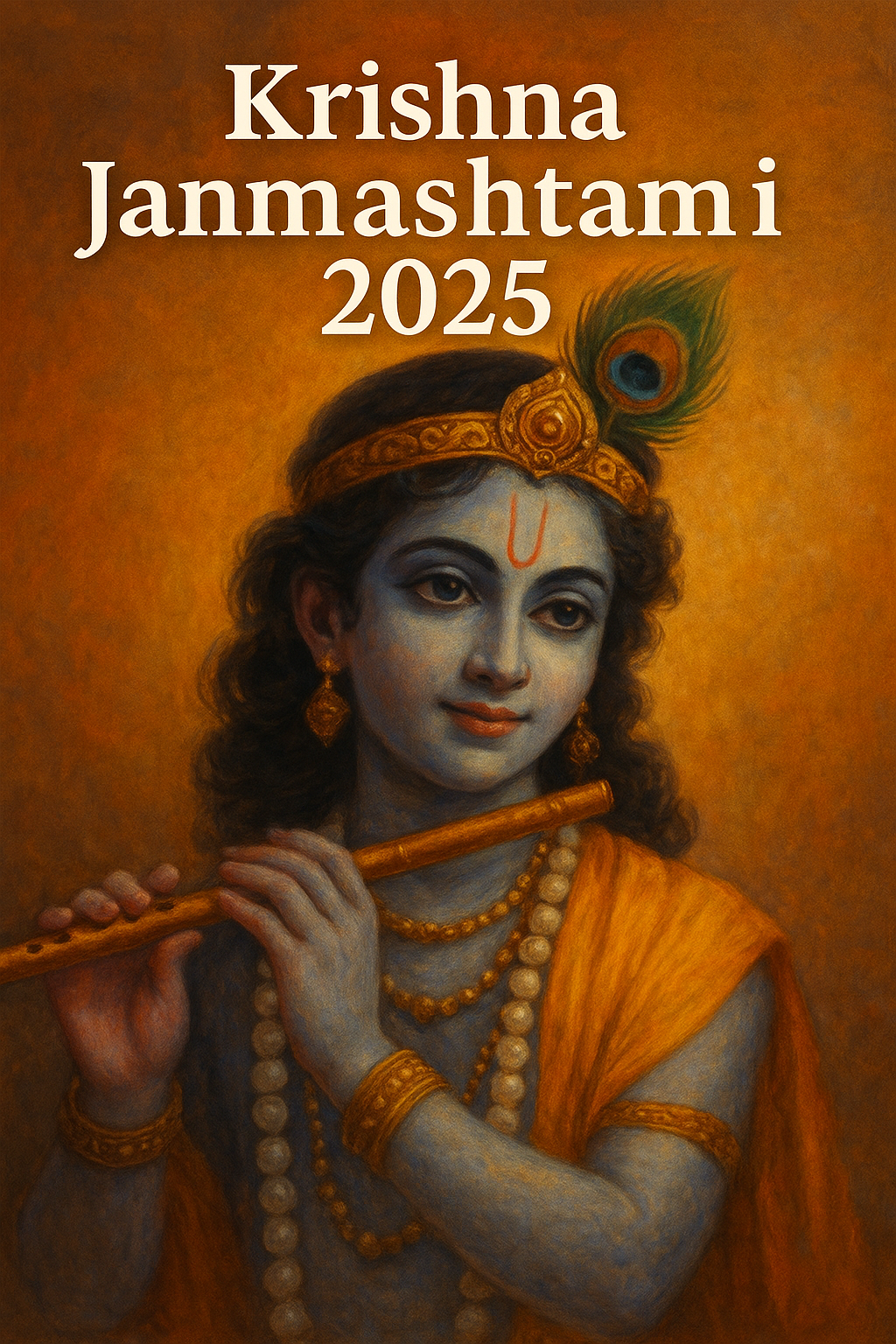
The festival of Krishna Janmashtami, marking the divine birth of Lord Krishna, is one of the most revered and celebrated occasions in Hindu culture. In 2025, this auspicious event will be observed with grandeur and devotion, as devotees across the globe prepare to honor the eighth avatar of Lord Vishnu. Krishna Janmashtami, also known as Gokulashtami, is a celebration of love, faith, and spiritual enlightenment, bringing people together in a joyous commemoration of Krishna’s life and teachings.
When is Krishna Janmashtami in 2025?
Krishna Janmashtami in 2025 will be observed on Thursday, August 14. The date is determined by the Hindu lunar calendar and falls on the eighth day (Ashtami) of the Krishna Paksha (dark fortnight) in the month of Bhadrapada. This timing coincides with the Rohini Nakshatra, believed to be the birth star of Lord Krishna, adding to the auspiciousness of the day. The celebration begins with a series of rituals, prayers, and fasting, culminating in the midnight hour when Lord Krishna is believed to have been born.
The Significance of Krishna Janmashtami
Krishna Janmashtami holds deep spiritual significance for millions of devotees. It commemorates the birth of Lord Krishna, who is revered as the harbinger of love, compassion, and dharma. According to Hindu mythology, Krishna was born in Mathura to Queen Devaki and King Vasudeva, under extraordinary circumstances. His birth was marked by divine interventions, as he was destined to vanquish evil and restore righteousness.
The tales of Krishna’s life, from his playful childhood in Gokul to his profound teachings in the Bhagavad Gita, inspire people to lead a life of virtue and devotion. Janmashtami serves as a reminder of Krishna’s teachings on love, humility, and selfless service, urging humanity to rise above materialism and embrace spirituality.
How Krishna Janmashtami is Celebrated
Krishna Janmashtami celebrations vary across regions, reflecting the cultural diversity of India. In temples, homes, and community centers, the festivities are marked by elaborate rituals, devotional songs, and vibrant cultural performances.
Midnight Puja and Birth Ceremony
The most significant aspect of Janmashtami is the midnight puja, symbolizing the precise moment of Krishna’s birth. Devotees adorn idols of baby Krishna with new clothes, ornaments, and garlands. The idols are placed in a cradle, which is gently rocked as devotees sing lullabies and bhajans. The atmosphere is filled with divine energy as the sound of conch shells and bells reverberates, heralding Krishna’s arrival.
The midnight ceremony is often preceded by abhishekam, a ritual bathing of the Krishna idol with sacred substances like milk, honey, ghee, and curd. This act of devotion is accompanied by chants of Vedic hymns and shlokas, invoking blessings and purifying the surroundings.
Fasting and Devotion
Fasting is a common practice during Janmashtami, observed as an act of devotion and purification. Devotees abstain from grains and consume fruits, milk, and other sattvic foods. The fast is broken after midnight with a special prasad prepared using ingredients like butter, honey, and milk—offerings symbolic of Krishna’s love for dairy products.
Some devotees also observe nirjala fasts, refraining from both food and water throughout the day, as a mark of their unwavering dedication. The act of fasting is seen as a means of purifying the body and mind, enhancing spiritual focus and connection with Lord Krishna.
Dahi Handi
In states like Maharashtra and Gujarat, Dahi Handi is a popular event during Janmashtami. Inspired by Krishna’s childhood antics of stealing butter, teams of participants form human pyramids to break a clay pot filled with curd, butter, and sweets. The event is accompanied by music, cheers, and an air of festivity, symbolizing unity and teamwork.
The Dahi Handi tradition also carries a deeper message, reflecting the joy of overcoming challenges and working together towards a common goal. The event draws large crowds and is often celebrated with great enthusiasm, especially in urban centers like Mumbai.
Cultural and Spiritual Activities
Rasleela Performances
Rasleela, a traditional dance-drama depicting episodes from Krishna’s life, is a highlight of Janmashtami celebrations. These performances, often staged in temples and cultural centers, narrate Krishna’s playful interactions with the gopis and his eternal love for Radha. Through vibrant costumes, soulful music, and expressive dance, Rasleela captures the essence of Krishna’s divine love and charisma.
Each scene in a Rasleela performance is crafted with precision, reflecting the spiritual and philosophical depth of Krishna’s life. From the enchanting Raas dance in Vrindavan to Krishna’s heroic deeds, the performances serve as a medium to impart moral and spiritual lessons.
Chanting and Devotional Songs

Devotees engage in chanting the Hare Krishna mantra and singing kirtans to invoke Krishna’s blessings. The rhythmic chanting creates a meditative ambiance, drawing participants into a state of spiritual bliss. The chanting sessions, often accompanied by musical instruments like the mridanga and kartals, bring communities together in a shared expression of devotion.
Decorations and Jhankis
Homes and temples are beautifully decorated with flowers, lights, and rangoli. Jhankis, or tableaux, depicting scenes from Krishna’s life, are created with great artistic skill. These visual representations serve as a medium to recount Krishna’s stories and inspire devotion among onlookers. Jhankis often feature intricate details, from depictions of the Yamuna River to Krishna’s miraculous feats, captivating viewers with their creativity.
In some regions, devotees set up elaborate Krishna Leela parks, recreating significant landmarks and events from Krishna’s life. These immersive installations provide a unique way for devotees, especially children, to connect with Krishna’s stories and teachings.
The Universal Appeal of Krishna Janmashtami
Beyond its religious significance, Krishna Janmashtami has a universal appeal that transcends boundaries. The teachings of Lord Krishna, emphasizing love, harmony, and the pursuit of truth, resonate with people of diverse faiths and cultures. His message of selfless action, as articulated in the Bhagavad Gita, continues to inspire leaders, philosophers, and spiritual seekers worldwide.
Krishna’s philosophy of detachment and mindfulness has found relevance in modern contexts, offering guidance for individuals navigating the complexities of contemporary life. His teachings on balancing duty and spirituality serve as a timeless roadmap for achieving inner peace and fulfillment.
Modern-Day Celebrations and Global Reach
In the contemporary era, Krishna Janmashtami has become a global phenomenon, celebrated by Indian diaspora communities and spiritual organizations like ISKCON (International Society for Krishna Consciousness). ISKCON temples across the world host grand celebrations, attracting devotees and curious visitors alike. The festivities include elaborate rituals, cultural programs, and vegetarian feasts, offering a glimpse into the rich heritage of India.
The advent of technology has also revolutionized Janmashtami celebrations. Live-streaming of temple ceremonies, online bhajan sessions, and virtual community events enable devotees to participate in the festivities from the comfort of their homes. Social media platforms play a significant role in spreading the joy and spirituality of Janmashtami, connecting people across geographical barriers.
In major cities like London, New York, and Sydney, Krishna Janmashtami is celebrated with great fervor, showcasing the global reach of Indian culture. The grand processions, cultural exhibitions, and interfaith dialogues organized during Janmashtami highlight the festival’s inclusive spirit and universal message.
Spiritual Lessons from Krishna’s Life
Krishna’s life is a treasure trove of spiritual wisdom. His playful demeanor as a child, his role as a protector and guide, and his profound teachings in the Bhagavad Gita offer invaluable lessons for leading a meaningful life. Janmashtami is an occasion to reflect on these teachings and strive to incorporate them into our daily lives.
The Power of Devotion
Krishna’s interactions with his devotees, especially the gopis and Radha, illustrate the transformative power of love and devotion. Their unwavering faith and surrender to Krishna serve as a reminder of the divine connection that can be achieved through pure and selfless love. The tales of Radha-Krishna’s eternal bond exemplify the transcendental nature of spiritual love, inspiring poets, artists, and philosophers through the ages.
Living with Dharma
Krishna’s role as a charioteer and guide to Arjuna during the Kurukshetra war underscores the importance of living in accordance with dharma (righteousness). His counsel encourages individuals to fulfill their responsibilities without attachment to the results, fostering a sense of detachment and inner peace. The concept of “Nishkama Karma,” or selfless action, articulated by Krishna, serves as a cornerstone of spiritual practice.
The Joy of Simplicity
Krishna’s love for simple pleasures, such as playing the flute and spending time with friends, teaches us to find joy in the present moment and appreciate life’s simple blessings. His playful nature reminds us to balance our responsibilities with moments of lightheartedness and celebration.
The Eternal Legacy of Krishna
As we delve deeper into the stories and teachings of Krishna, we realize that his legacy extends far beyond the realms of mythology. Krishna embodies the eternal principles of love, truth, and wisdom, guiding humanity toward a harmonious and purposeful existence. Janmashtami serves as a beacon of hope and inspiration, urging us to embrace Krishna’s virtues and strive for spiritual growth.
Conclusion
Krishna Janmashtami 2025 is not just a festival; it is a spiritual journey that unites people in their love and reverence for Lord Krishna. The vibrant celebrations, profound rituals, and timeless teachings associated with this auspicious day offer a glimpse into the rich tapestry of Indian culture and spirituality. As we prepare to celebrate Krishna’s birth, let us embrace his teachings and strive to lead a life filled with love, compassion, and devotion. May the divine blessings of Lord Krishna illuminate our hearts and guide us on the path of righteousness.
In a world filled with challenges and uncertainties, Krishna’s teachings remind us of the enduring power of faith, resilience, and selfless love. Let this Janmashtami be an opportunity to reconnect with our inner selves, nurture our spiritual aspirations, and spread joy and positivity to those around us. The celebration of Krishna Janmashtami is not merely an event; it is a timeless ode to the universal values that bind humanity together in a shared quest for truth and divinity.

